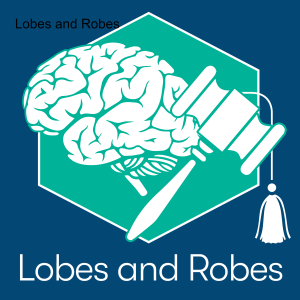Lobes and Robes
Neuroscience for Everyone! Advances in neuroscience have important implications for the development of policies designed to meet looming challenges in health care, aging, education, bioethics, child welfare, environmental and national security. Furthermore, addiction, violent crime, dementia, and obesity pose threats to our well-being that are unlikely to be addressed effectively without the translation of sound behavioral and neuroscience into effective public policy and law. Lobes and Robes, a new podcast developed by the Department of Neuroscience in cooperation with the School of Public Affairs and the Washington College of Law, brings scientists and policymakers together to address some of the most pressing problems of our time. Lobes and Robes is produced by the American University’s Center for Neuroscience and Behavior shares dispatches from the intersection of law, science, and public policy.
Episodes

Tuesday Jun 21, 2022
Tuesday Jun 21, 2022
Foods that harm and foods that protect the brain. The focus of this episode is on the research of Professor Katie Holton, who hold joint appointments in the Department of Health Studies and the Department of Neuroscience at AU. Dr. Holton discusses with Professors Carle and Davidson, how foods containing high level of glutamate can have toxic effects on the brain--effects that have been linked to the occurrence of fibromyalgia and Gulf War illness. Combining her expertise in nutrition and in neuroscience, Dr. Holton explains her research which shows that a specially formulated diet that is low in glutamate can dramatically reduce the symptoms of both diseases. Dr. Holton also describes the types of food that contain both high and low amounts of glutamate and how some foods may protect against the neuronal damage produced by glutamate toxicity. More about Dr. Holton’s work can be found here: https://www.american.edu/cas/faculty/holton.cfm

Tuesday May 31, 2022
Tuesday May 31, 2022
This episode features AU Chemistry Professor Stefano Costanzi, an expert both on the harm chemicals pose to living organisms and global security policies aimed at protecting the public from those dangers. In conversation with Drs. Carle and Davidson, Dr. Costanzi discusses the gaps in current policies and practices that allow chemical weapons to proliferate as well as some of his ideas about solutions and tools to narrow those gaps. Dr. Costanzi’s work itself bridges the neuroscience and public policy divide, and in so doing he models how science and policy can be brought into communication with each other. More about Dr. Costanzi’s work can be found here: https://www.american.edu/cas/faculty/costanzi.cfm.

Tuesday May 17, 2022
Tuesday May 17, 2022
This episode presents a dialogue involving economist Dr. Erdal Tekin, a member of AU’s Department of Public Administration and Policy, along with neuroscientists Terry Davidson and Tony Riley, and law professor Susan Carle discussing research and policy approaches to drug abuse, obesity and other potentially harmful brain-based behaviors. Dr. Erdal explains how economists think about addiction and other types of self-destructive behavior as a problem of “time inconsistency”—in other words, individuals sometimes don’t calculate the value of their future preferences sufficiently in deciding on their current actions. Davidson, Riley and Carle then discus bringing economics and neuroscience together in preventing and treating addiction and obesity and the need for more inter-disciplinary collaboration. More information about Dr. Tekin and his work can be found here: https://www.american.edu/spa/faculty/tekin.cfm

Tuesday May 03, 2022
Tuesday May 03, 2022
The Neuroscience of Drug Abuse: This episode features AU Professor of Neuroscience Dr. Anthony Riley discussing his research on the neuroscience of drug abuse. Drugs cause both positive and negative effects on the brain; drug use becomes problematic when negative effects overwhelm the brain’s ability to compensate. Dr Riley discusses the policy challenges revealed by the neuroscience of addiction, including what he sees as one of the biggest problems—namely, relapse. Riley, Davidson and Carle also discuss gene expression, adolescence, the microbiome, and other factors that affect likelihood of drug use escalation and therefore are important to public policy interventions. More about Dr. Riley and his research can be found here https://www.american.edu/cas/faculty/alriley.cfm.

Tuesday Apr 19, 2022
Tuesday Apr 19, 2022
Good neuroscience may contribute to policy advances, but what happens when inaccurate myths about neuroscience take hold? With Professor Carle and Dr. Davidson, AU School of Education Professor Dr. Alida Anderson discusses her research on “neuro-myths” in education policy. Anderson explains what some of these neuro-myths are, how they may lead educators and policymakers astray, and how training can help decrease the prevalence and harms neuro-myths may cause. More about Dr. Anderson and her research can be found here:. https://www.american.edu/soe/faculty/aanderso.cfm

Tuesday Mar 29, 2022
Tuesday Mar 29, 2022
This episode features Professor of Law Dr. Lewis Grossman, an expert on food and drug law and legal history, in conversation with Dr. Davidson and Dr. Carle to explore the policy implications of neuroscience research on the Western diet and obesity. The discussion with Dr. Grossman focuses on various potential policy options for labeling, limiting, and/or “nudging” approaches to lower consumption of harmful foods. More about Dr. Grossman and his work, including a new book, Choose Your Own Medicine, can be found here: https://www.wcl.american.edu/community/faculty/profile/lgrossman/bio/

Monday Feb 21, 2022
Monday Feb 21, 2022
Professor Susan Carle of the Washington College of Law and AU Distinguished Professor of Neuroscience, Dr. Terry Davidson, discuss Davidson’s research of on the connections between a diet high in saturated fats and sugars, sometimes called the Western diet, and deficits in learning and memory tasks and the regulation of food intake. Dr. Davidson discusses the implication of his findings for understanding obesity and behavioral excess such as drug abuse. Might there be common brain mech…


